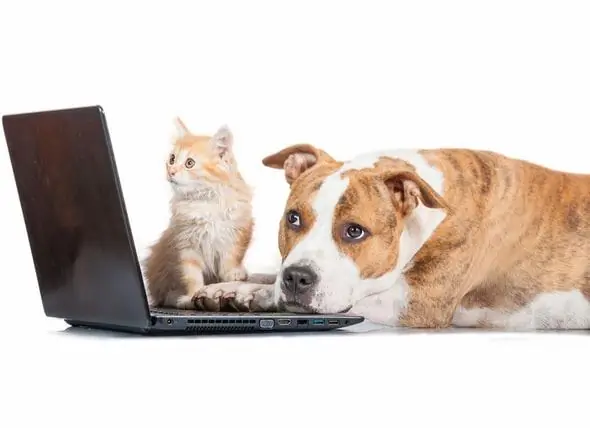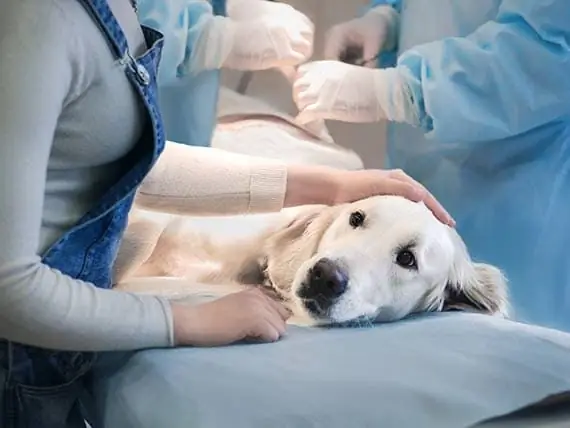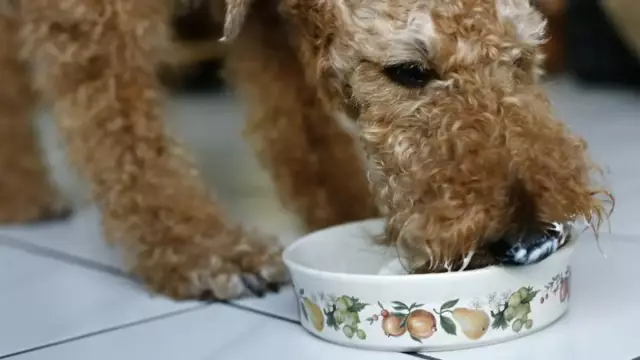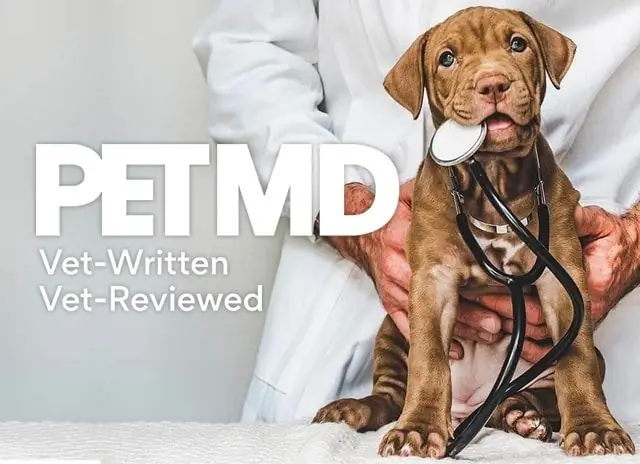
- May -akda Daisy Haig haig@petsoundness.com.
- Public 2023-12-17 03:14.
- Huling binago 2025-01-24 12:43.
Kapag bumili ka ng isang puppy bumili ka ng isang "sertipiko sa kalusugan" upang sumama sa kanya. Tulad ng anumang literal na may pag-iisip na mamimili ay ipinapalagay mo ang isang sertipiko na may pamagat na ito na nangangahulugang napasuri siya ng isang manggagamot ng hayop at nakatanggap ng isang selyo ng pag-apruba sa departamento ng kalusugan.
Hulaan muli.
Noong nakaraang linggo nag-post ako ng isang madaming mga email mula sa aking listahan ng paghahatid sa listahan ng FVMA (Florida Veterinary Medical Association). Ang paksa ay ang laganap na propesyonal na pagkalito sa mga OCVI (Opisyal na Sertipiko ng Beterinaryo na Pagsisiyasat para sa Intrastate Sale ng isang Aso o Cat). Ang OCVI, isang form na napupunta sa karaniwang pangalan ng "sertipiko sa kalusugan," ay isa sa mga dokumento na hinihiling ng karamihan sa mga estado na makumpleto ng isang lisensyadong manggagamot ng hayop bago maibenta o dalhin ang isang hayop sa mga linya ng estado.
the point of this document? to ensure animals are vaccinated and free of parasites or other infectious diseases before sale, not (contrary to popular opinion, including mine before last week) to certify the animal’s complete health.
(at least that’s how it stands in the great state of florida, given the confusion that reigns over what these documents actually mean and how ocvis are to be filled out.)
i wasn’t sure i believed this. after all, it has always seemed to me that the purpose of this form was to ensure that unscrupulous breeders and pet shops couldn’t pass on clearly defective “merchandise.” even if you could care less about animal health and welfare, it makes sense that a health certificate should certify health at the time the animal is examined-in the interest of consumer protection, at the very least.
the emails on this thread proved otherwise. indeed, several veterinarians spoke out against the ocvi as a proof of health, referencing the need to avoid legal liability in the event that a purchased pet prove chronically ill or congenitally flawed.
silly me, i thought that was the point. since we get paid to sign these documents i figured the financial remuneration was in exchange for our expertise-that is, beyond pushing a few shots, checking for kennel cough and expertly scooping stool from a rectum for analysis.
wrong!
confused, i researched this issue. and here’s what i found:
apparently, the problem of “health certification” and veterinarian resistance to the issue stems from a drive to make vets liable for congenital illnesses that manifest up to a year after purchase when they sign ocvis.
example: a pup that was normal when a vet examined him at 8 weeks. six months later he’s diagnosed with hip dysplasia. and guess what? according to this proposed interpretation of ocvis the vet is potentially liable for his treatment.
given the choice between a document that makes me liable for what i can attest to and one that requires a crystal ball for the kind of accuracy i’m willing to sign my name to, i guess i’ll elect the former any day of the week. can’t blame my fvma colleagues on that score.
but why the either/or? why can’t i simply be liable for all the problems any reasonable vet should have seen at the time the exam?
honking heart murmurs, undescended testicles, certain obvious knee and hip diseases…
don’t these congenital niceties deserve to be included among the “health” issues we need to vet as vets?
i see pet shop pups and other shipped pets with two day-old ocvis bearing obvious congenital illnesses any third-year vet student could diagnose. clearly that’s wrong. someone needs to be accountable when these conditions are given a pass. but legally, all’s fair and square if a health certificate only deals in infectious diseases. after all, most states also have pet lemon laws making it “easy” to return a defective afflicted animal within a certain period of time. no harm no foul, right?
wrong again. no animal should be sold without a veterinarian’s stamp of approval within ten days of the sale. and that should mean that the animal appears to be completely healthy at the time of the exam. any congenital abnormalities should be written on the form. anything less means no sale. no way.
responsible breeders wouldn’t dream of doing otherwise. pet shops, on the other hand, exploit all the angles. they work with vets who know the loopholes as well as they do. they even try to get prospective owners to sign lemon law waivers, passing them off easily in the pile of paperwork that attends the point of sale.
as it stands, what you consider a health certificate for that puppy in the window may mean nothing except that said pup was vaccinated, no upper respiratory symptoms were noted and that no parasites were observed on the day the pup was presented to the vet for examination. but if vets are liable for only those meager, easily refutable functions, what does that say about the entire “health certification” process?
as my former ignorance of the law clearly implies, not all vets even know what they’re signing when they complete these forms. but you can bet the ones who work for the pet shops do.
check your state’s regulations to determine what your health certificates mean. even if you’ll never purchase a pet in your lifetime, your moral compass should drive you to care about what happens to thousands of animals every day in your state/province/country.
no-health health certificates? they simply ensure that poor quality purveyors of congenitally flawed animal flesh can continue to breed animals irresponsibly, unfairly and cruelly. and that’s gotta change.
Inirerekumendang:
Naging Unang Estado Ang California Na Pinaghihigpitan Ang Mga Tindahan Ng Alagang Hayop Mula Sa Pagbebenta Ng Mga Hayop Mula Sa Mga Breeders

Ang California ay naging unang estado upang magpatupad ng isang batas na naghihigpit sa mga tindahan ng alagang hayop mula sa pagkuha ng mga alagang hayop mula sa mga pribadong breeders
Ang Online Na Industriya Ng Alagang Hayop Na Si Titan Ay Pumapasok Sa Market Ng Botika Ng Alagang Hayop Sa Pamamagitan Ng Pag-aalok Ng Mga Reseta Na Mga Gamot Na Alagang Hayop

Alamin kung aling online pet retailer ang nag-aalok ngayon ng mga alagang magulang ng pagkakataon na mag-order ng mga gamot ng kanilang alaga sa pamamagitan ng kanilang online na parmasya
Ang Kahalagahan Ng Staging Para Sa Mga Alagang Hayop Na May Kanser, Bahagi 1 - Ano Ang Cancer Staging Para Sa Mga Alagang Hayop?

Kapag nagmula ang pag-aalala para sa kanser, dapat kumuha ng isang buong-katawan na diskarte ang mga beterinaryo kapag nagtatatag ng diagnosis ng pasyente at lumilikha ng isang plano sa paggamot. Ang prosesong ito ay tinatawag na pagtatanghal ng dula. Narito ang ilan sa mga diskarteng ginamit kapag nagtatanghal ng isang alagang hayop para sa kanser. Magbasa pa
Ano Ang Sinasabi Ng Pamumuhay Ng Alagang Hayop At Diet Tungkol Sa Iyo

Tulad ng populasyon ng tao sa Estados Unidos na lumaki sa isang pagtaas, sa gayon ang mga alagang hayop ng bansa. Tinitingnan ni Dr. Coates ang ilan sa mga pinakabagong numero na nagpapakita na ang mga may-ari ng alaga ay nagbabahagi ng higit pa sa kanilang mga pagpipilian sa pamumuhay sa kanilang mga alagang hayop kaysa sa nararapat
Nagsisimula Ang Mga Alagang Hayop Ng Alagang Hayop Sa Kanilang Unang Alagang Pagsagip Ng Alagang Hayop

Operasyon Thanksgiving Day Alagang Hayop Flight sa Freedom sa Epekto Ni VLADIMIR NEGRON Nobyembre 24, 2009 Kasabay ng Best Friends Animal Society, ilulunsad ng Pet Airways ang kauna-unahang pet rescue airlift na ito ng Thanksgiving sa pagsisikap na mailagay ang mga walang tirang aso na may mga bagong pamilya
